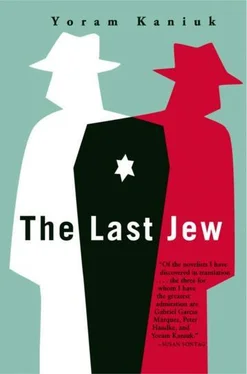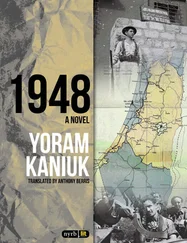Noga was alert to rapid changes. For some reason that pain touched her heart, the effort to win a position that was completely unnecessary. She loved Rebecca's face. That woman bows her head before death, doesn't want crumbs, but the whole, can kill Boaz to hold onto him. Her heart was stirred to pity, and Noga who knew only one love envied Rebecca, who could ask of her what people ask in old, unreliable stories. She almost said: Take him, but she knew that both Rebecca and she depended on Boaz more than he depended on them.
Late at night, everybody was tipsy. Even Rebecca tried to dance and fell into Boaz's open arms, and he hugged her as somebody who knew he had lost her that day to a girl his foster mother saw as a reflection of purity in the features of a murderer.
Tape / -
When Jordana disappeared, they phoned from the Ministry of Defense. Then Noga sat down, and Boaz, holding a narghila to plant a pinch of cannabis in it, put the mouth of the narghila he had brought from Mount Sinai to Noga's mouth, and Noga looked like an old Indian sunk in meditation, and Boaz went to drizzle water on the cannabis bush, which had meanwhile grown solitary in a brown flowerpot, where a fragrant jasmine bush had previously grown. The roof was crammed with flowerpots and smells, Noga brought spices she had cultivated and pruned and watered, and Boaz, who tried to check whether airplanes were continuing to fly low toward the airport, felt a pleasant giddiness, he landed next to Noga and stroked her back. Noga said, Jordana disappeared!
When? asked Boaz.
They haven't heard from her in months, and only now did they call, the bastards.
Boaz took off the cotton shirt, smelled his own odor, and tossed the shirt into the corner of the room. Then he stood up, his torso naked, and tried to let the thoughts run around in his brain. He said: If you hadn't given her Menahem, she wouldn't have run away!
Noga didn't answer, and pondered quietly. Her face was furrowed with new lines that would disappear later. Her eyes were sunk deep in their sockets. He saw her body harden and wanted to ask her to stop thinking about Jordana, but Noga thought of what he said and suddenly a distant pain condensed in her that tormented her again, and she said: Why when you want to pity do you attack?
He stood still and didn't know what to do with himself, Noga clasped the narghila, thrust her hands in it and tossed it to Boaz. He ducked and the narghila hit the pile of sheets Noga was about to put into the linen closet. Then she dropped her eyes, and said: Where did she disappear?
Boaz said: Why is that so important? Maybe she just couldn't take it anymore?
Noga got up and went to the kitchen, opened the refrigerator, looked at the row of eggs in their niches and picked up a carton of milk, opened it, tried to pour the milk into an empty space with no cup, changed her mind, put the milk in the refrigerator, and sat down in front of the old grandfather clock. The milk flowed on the countertop, and Boaz, who tried not to see Noga, pushed the pinch of cannabis into the narghila that wasn't broken. She searched for music, but on all the stations there was only talk. She turned off the radio and opened the chest, took out papers, and read aloud the numbers she had written at night after they returned from the unveiling of the memorial at the Dead Sea, when Boaz asked her to prepare the income tax report: the mileage doesn't fit the gas receipts, she said, and Boaz said: I can't calculate everything exactly. He saw Jordana's lost face among the memorial books, Obadiah Henkin strolling in the mountains and showing her where her beloved fought, tried to pity himself and Noga.
On the way to Henkin's house, they stopped at a cafe. Next to the wall, four men sat and talked. Around each one of them you could see the aura of foreignness. The old men yelled to one another in order to be scared less and to be present. Boaz could understand Jordana's not-being in the space between those men and themselves. He didn't know who they were, but they looked as if they were still expecting something that would never happen. And Boaz knew that wound, knew how to smell it in the distance, and Noga, who knew how much the pain costs afterward, asked Boaz to leave. He understood her fear and left. Henkin's house suddenly looked like a frontier. One window in Ebenezer's house was painted a new color. Why does he paint at night? he asked Noga, and Noga said: How do I know what your father does?
Obadiah Henkin sat at his table and looked at Boaz and at the door at the same time. Through the open door, Hasha could be seen carefully drawing Noga's wild hair off her forehead, and gave her a small round mirror. After they combed their hair and each looked in the little mirror, Hasha gave Noga a glass of cold lemonade, and Henkin said to Boaz: The story about Jordana has been worrying me a long time now. I didn't know what happened, the Shimonis said they saw her in Kiryat Haim. They went to the Galilee on their memorial day, on the way back they stopped for a cup of coffee, and in the distance they saw what Mrs. Shimoni described as a familiar back and then they made out her profile, but by the time Mrs. Shimoni stood up and found her coat hanging under three coats, she disappeared in the direction of what she described as a boulevard facing the highway. I really don't know what she's doing there…
Jordana's parents' family doctor knew some details he was willing to reveal. He told Noga: She went through a difficult experience. He didn't know where she lived or how to find her, but a doctor at the clinic in Kiryat Bialik called him about Jordana, and asked if she could take five-milligram Valiums and how to give it to her, and what were her reasons for needing Valium.
On the way to the suburbs of Haifa, cows were seen grazing near a field shaded by a row of thin-trunked cedars, and a heavy red horse was seen leaping with clumsy nobility. They bypassed Haifa and came to the suburbs in a heavy cloud of soot. The Carmel was buried in a giant bubble of sweetish stinking stickiness.
When they entered the small one-room apartment, Jordana looked docile, curled up in a giant armchair with torn upholstery, and remnants of foam rubber popped out of the worn back. In the small ugly mirror hanging next to the television that was on, she appeared sucking her thumb. Her eyes were fixed on the screen and on her face was a faded look. She raised her hand to beckon them in. On the screen was a teacher, the teacher was talking about decimals, it was a fifth-grade education program.
Boaz looked around, tried to take in the sight, maybe he even understood. He touched a leaf of a bunch of dead narcissi stuck in a blue vase, with no water. When he touched the leaf, dry white petals dropped off. The room had the musty odor of locked windows, orange peels, and skin lotion. Noga went to Jordana and hugged her from behind, and Jordana took Noga's hand, held it to her face, tears began flowing on her cheeks and she softened a bit, turned sideways toward the guests, stared stoned and stunned, tried to take her eyes off the screen, but when Boaz turned off the television the tears became clearer and hotter, and she turned the television back on in a panic, stared at the screen, as if she didn't see a thing, and Boaz turned it off again.
Jordana reached for the television, but fell down and Noga caught her. They picked her up and saw how thin she had become, sat her on a small sheet like a baby on a rough green bedspread. Jordana asked for water. Boaz went to the neglected kitchen, washed some glasses that were moldering in the sink, opened the refrigerator that held one egg, a rotten tomato, nuts, chocolate, and five jars of cold water that had been filled long ago and had turned yellow, took out some ice, put it in the glasses, poured tap water into them, and went back in the room. Jordana looked at him and for a moment, a smile ignited in her eyes. She drank two glasses of water in a row and asked for a cigarette. After she smoked a few minutes and smoke swirled around her face, she said: You remember that I once lost a child?
Читать дальше












